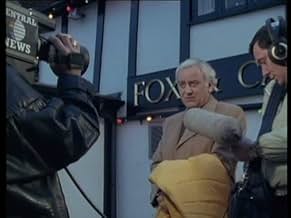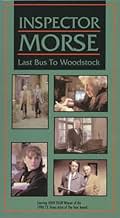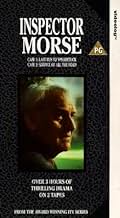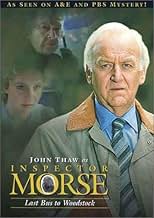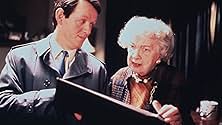A young blonde hitches a late lift from a bus stop and ends up dead in a pub car park.A young blonde hitches a late lift from a bus stop and ends up dead in a pub car park.A young blonde hitches a late lift from a bus stop and ends up dead in a pub car park.
- Director
- Writers
- All cast & crew
- Production, box office & more at IMDbPro
Featured reviews
My second favourite episode of this wonderful series - made so by the magnificent appearances of Ian Sears (so good in BBC's Johnny Jarvis; Autumn 1983); Perry Fenwick (the latter memorably addressing the former as a "tosser") and, best of all, the luminous, gorgeous and underused Jenny Jay. Almost inevitably, Morse takes out a crush on a witness - not knowing she is sexually involved with another witness; thus Morse is further established as a man of continuing romantic disappointment: in this case where his nemesis and his icon are inextricably linked. As with virtually all Morse actors, Anthony Bate couldn't turn in a duff performance to save his life; and he's ably abetted here by Peter Woodthorpe in his final appearance as pathologist Max, and the scrumptious Holly Aird with skirts billowing as she balletically swans around college; also on display is the marvellous Fabia Drake looking not a day older than she did in the opening episode of The Prisoner 20 years earlier; and the ever reliable Terrence Hardiman as a company executive doing obtuse as only he can. All told then 10/10 Mark James Burden
Other reviewers love this episode but I had to watch the first half twice just to get the characters straight. Morse only has two hours to solve the crime so I guess he's entitled to some miraculous guesses but he left me baffled at his technique. Then again, maybe I'm too dense to follow the train of logic he employs. One other irritating point: what happens to the confused characters Morse runs into during the show? The episode so thoroughly examines their lives--such as the two lovers at the victim's place of business--that I expected either some resolution of their problems or a showing of their continued despair. As it is, they were basically left on the cutting room floor. Despite my objections, I say watch the show and appreciate the moving depiction of the often depressing state of human relations that fascinate Morse and his fans.
"You're going to like this one. Quite a puzzle", says Max in this adaptation of Colin Dexter's first novel. Quite right: A girl is dead, and in her purse is a mysterious envelope, empty but for a coded letter, reading "Take this, please."
One of the best Morse episodes, Last Bus to Woodstock has a plot that twists and turns, keeping both Morse and the viewer stumped until the last moment, when the dreadful truth sinks in.
Gender roles and loneliness are the recurring themes that serve as the foundation for this visit to Oxford: Among the dozens of characters introduced, all but two live hauntingly lonely lives, coping as they may -- through drinking, gambling, sex and adultery.
The first exception is an old miss Marple type. She has learned to deal with the loneliness, or even appreciate it. The second exception is Angie, a young and amiable English literature student, who has yet to face the harsh facts of life. Of course, her innocence can't last, and eventually she gets her unpleasant rite of passage into adulthood.
As often with Morse, the conclusion is only half satisfying: Although the case is closed, there's no sense of justice being fulfilled, only lives ruined, a little more misery in an already miserable world. The Inspector Morse series never drew the nicest picture of society, but in this episode, it seems particularly grim.
One of the best Morse episodes, Last Bus to Woodstock has a plot that twists and turns, keeping both Morse and the viewer stumped until the last moment, when the dreadful truth sinks in.
Gender roles and loneliness are the recurring themes that serve as the foundation for this visit to Oxford: Among the dozens of characters introduced, all but two live hauntingly lonely lives, coping as they may -- through drinking, gambling, sex and adultery.
The first exception is an old miss Marple type. She has learned to deal with the loneliness, or even appreciate it. The second exception is Angie, a young and amiable English literature student, who has yet to face the harsh facts of life. Of course, her innocence can't last, and eventually she gets her unpleasant rite of passage into adulthood.
As often with Morse, the conclusion is only half satisfying: Although the case is closed, there's no sense of justice being fulfilled, only lives ruined, a little more misery in an already miserable world. The Inspector Morse series never drew the nicest picture of society, but in this episode, it seems particularly grim.
"Last Bus to Woodstock" is one of those typical Morse episodes that brings in several plots and makes you concentrate, which is a good thing.
A young woman, Sylvia Kane, is found dead in the car park of a pub. On her is an empty envelope addressed to someone else, Jennifer Coleby, and a letter, written in code. Morse guesses the envelope was full of money. She was intending to meet a young man at the pub.
Sylvia was hitching a ride to Woodstock when last seen. A visit to where she worked doesn't yield much, except Jennifer Coleby (Jill Baker) works there, and she's having an affair with the boss.
Coleby lives in a house and takes in roommates. One is a nurse, Mary, and another a student, Angie. Jennifer claims to know nothing about the letter and says that, while it was addressed to her, she was to pass it to someone else.
To whom was she to pass the letter? What was really in it? If it was money, who has it? Where is the person who picked Sylvia up? Is that the killer? Morse and Lewis have a lot to work out.
Excellent episode with marvelous acting by Morse, Kevin Whately, Anthony Bate, Jill Baker, and Fabia Drake, who plays an elderly witness to the hitchhiking. The denouement is not what you'd expect.
This is one series I really miss, particularly the character of Morse. I guess I'm not alone, or we would have had the "Inspector Lewis" series and "Endeavor."
A young woman, Sylvia Kane, is found dead in the car park of a pub. On her is an empty envelope addressed to someone else, Jennifer Coleby, and a letter, written in code. Morse guesses the envelope was full of money. She was intending to meet a young man at the pub.
Sylvia was hitching a ride to Woodstock when last seen. A visit to where she worked doesn't yield much, except Jennifer Coleby (Jill Baker) works there, and she's having an affair with the boss.
Coleby lives in a house and takes in roommates. One is a nurse, Mary, and another a student, Angie. Jennifer claims to know nothing about the letter and says that, while it was addressed to her, she was to pass it to someone else.
To whom was she to pass the letter? What was really in it? If it was money, who has it? Where is the person who picked Sylvia up? Is that the killer? Morse and Lewis have a lot to work out.
Excellent episode with marvelous acting by Morse, Kevin Whately, Anthony Bate, Jill Baker, and Fabia Drake, who plays an elderly witness to the hitchhiking. The denouement is not what you'd expect.
This is one series I really miss, particularly the character of Morse. I guess I'm not alone, or we would have had the "Inspector Lewis" series and "Endeavor."
Last Bus to Woodstock is one of the best Morse episodes,, certainly my favorite episode of season two. It gets the balance just right. Morse is at his most courteous - there's plenty of Lewis and Max (unfortunately, this is Max's last episode) - there's talk about religion, literature, sex, love, all the stuff we love about the show. It also manages to be reasonably coherent; I could keep up with the characters; the conclusion only had one out-of-place coincidence.
There are a few men, but the focus is really on the splendid female characters, from Fabia Drake, above, as the lovely, lovely Mrs. Jarman (this terrific sequence is exactly what would happen if Marple met Morse - and come to think of it, that's a series crossover that really should happen) to Holly Aird as Angie Hartmann, a young woman who shares Morse's love of literature.
Morse has lots of good conversations with interesting women, but doesn't date any of them, interestingly. (I understand this was not the case in the book.) Relationships (as noted in this review) tend to be shown in a very poor light - and Morse is about the only positive male character. The theme is most blatant in a scene in which Morse lectures Lewis for adopting a proprietorial tone towards Valerie: "I don't want to own anyone." Could a relationship based not on possession but on love be the answer? Is that even possible? The question is left hanging.
For more detective reviews: http://www.longish95.blogspot.com/p/the- detectives.html
There are a few men, but the focus is really on the splendid female characters, from Fabia Drake, above, as the lovely, lovely Mrs. Jarman (this terrific sequence is exactly what would happen if Marple met Morse - and come to think of it, that's a series crossover that really should happen) to Holly Aird as Angie Hartmann, a young woman who shares Morse's love of literature.
Morse has lots of good conversations with interesting women, but doesn't date any of them, interestingly. (I understand this was not the case in the book.) Relationships (as noted in this review) tend to be shown in a very poor light - and Morse is about the only positive male character. The theme is most blatant in a scene in which Morse lectures Lewis for adopting a proprietorial tone towards Valerie: "I don't want to own anyone." Could a relationship based not on possession but on love be the answer? Is that even possible? The question is left hanging.
For more detective reviews: http://www.longish95.blogspot.com/p/the- detectives.html
Did you know
- TriviaThis is the last episode featuring Peter Woodthorpe as pathologist Max.
- GoofsAt the beginning after examining the body Dr. DeBryn removes his gloves from the outside instead of the usual inside-out manner used by medical professionals. He would have contaminated his hands by removing his gloves in this fashion.
- Quotes
[talking about deathbed confessions]
Chief Inspector Morse: The church loves a repentant sinner. Good for business.
- Crazy creditsVass Anderson is credited as Mr Bently but addressed as Mr Gill (Hardware shop owner).
- SoundtracksCosì fan tutte
Composed by Wolfgang Amadeus Mozart
Details
- Release date
- Country of origin
- Official site
- Language
- Filming locations
- Production companies
- See more company credits at IMDbPro
Contribute to this page
Suggest an edit or add missing content

